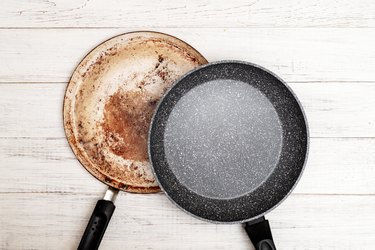
It's yielded hundreds of perfectly fried eggs and golden pancakes over the years, and now that battered old nonstick pan is showing its age. After you buy a replacement, what can you do with the old pan? Since nonstick pans are made of metal, you might assume that there's an easy recycling option available. Unfortunately, nonstick cookware isn't as easy to recycle as other scrap metal. That said, there's at least one free way to recycle nonstick pans – and it's going to involve a trip to the post office.
How Not to Recycle Nonstick Pans
Video of the Day
Here's one method that almost certainly won't work for recycling nonstick pans: putting them in your recycling bin for curbside pickup. Municipalities and private recycling companies have strict rules about what kinds of materials can be put in curbside bins. Some kinds of metal may be acceptable, including clean tin cans and balls of used aluminum foil. But cookware generally isn't allowed in curbside bins – especially nonstick cookware.
Video of the Day
The major obstacle to recycling nonstick pans is the nonstick coating itself. It's generally made of a polymer called polytetrafluoroethylene (aka Teflon). Untreated metal is generally highly recyclable. But once the nonstick coating has been applied, it has to be removed before the metal underneath can be processed and recycled. Most recycling facilities just don't have the capacity to do that in a cost-effective way.
How to Recycle Nonstick Pans
You have a few options for how to responsibly dispose of old nonstick pans. If they're slightly warped or dinged but still usable, donating nonstick pans is your best bet. Drop them off to a donation center, or contact organizations in your area that work with homeless families or refugees. These groups may need gently-used housewares for people who are setting up new homes. Or, search online for a local freecycling group where you may connect with someone who wants your old pans.
Another option is to find a manufacturer or national recycling program that accepts used cookware for recycling. While your local recycling center may not be set up to recycle nonstick pans, manufacturers that collect a large amount of used cookware have more options for cleaning and recycling these items.
For example, TerraCycle and Calphalon have teamed up to create a cooking tools recycling program. Anyone can use the program by signing up and printing a free shipping label. Then box up your old nonstick pans or other metal cookware (all brands accepted) and ship them off to TerraCycle. Old pans are cleaned, processed and melted down to create new products.
How to Recycle Other Cookware
TerraCycle and Calphalon's recycling program is a good option for disposing of other kinds of old metal cookware that are too beat up to donate. But shipping a big box of pots and pans across the country may not be the most environmentally friendly way to recycle them. If you're getting rid of stainless steel or cast iron cookware, look for a local scrap metal recycler near you. They'll take your old metal household items and you may even make a little money for them.
Just make sure you know whether your cookware is made of ferrous (containing iron) or non-ferrous metals. Stainless steel and cast iron are ferrous, while aluminum and copper are non-ferrous. The distinction matters because some scrap metal recyclers only take one type or the other. If you're not sure, try holding a magnet to each pot or pan. The magnet should stick to anything ferrous.
Old glass bakeware can be donated as long as it's not chipped, cracked or otherwise too damaged to use. Once it's no longer usable, it should be disposed of in the trash. Wrap glass bakeware in newspaper or old fabric and place it inside a plastic bag before putting it your trash can for collection. If the glass breaks during transit to the landfill, wrapping it carefully should keep shards contained.